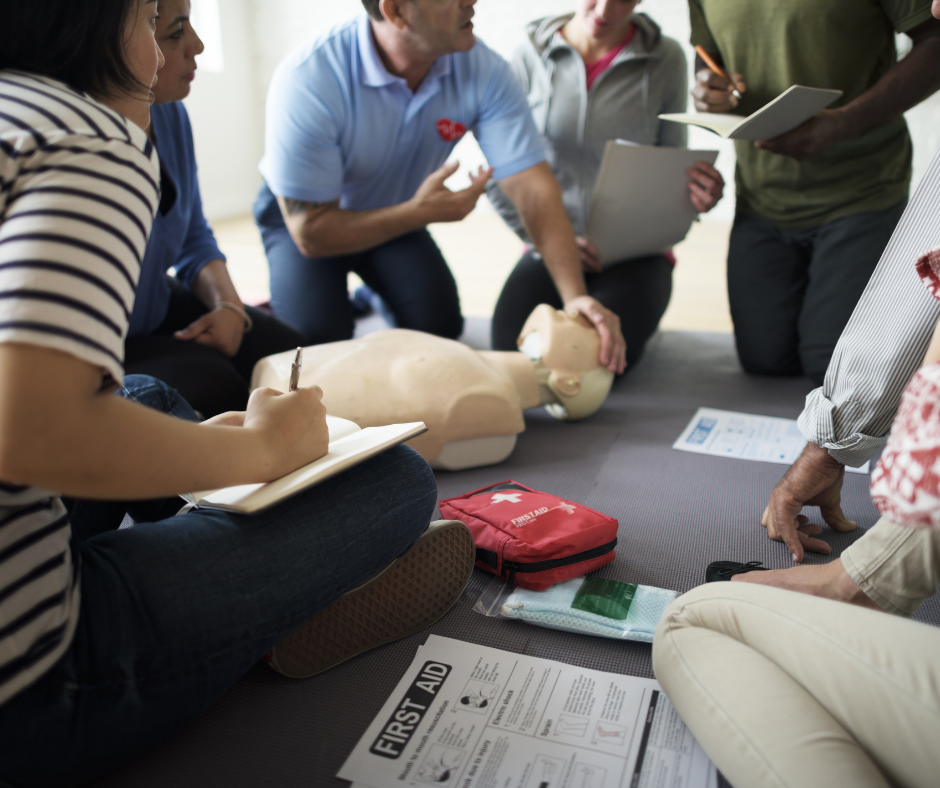Accidents don’t only happen to other people. Often, the first few minutes following an emergency, illness, or fall make all the difference. Knowing how to react could save a life. In Luxembourg, first aid training is strongly encouraged and sometimes legally required for businesses. It allows everyone to acquire life-saving skills through structured courses available throughout the Grand Duchy.

First Aid Training: A Life-Saving Priority
First aid training serves a dual purpose: protecting your loved ones effectively and meeting workplace legal requirements. These precise techniques save valuable time, provide reassurance, and stabilise a situation while waiting for emergency services.
Why Train in First Aid?
First aid training is a civic and responsible gesture rooted in solidarity. Without the immediate intervention of a bystander, particularly in cases of cardiac arrest, the survival odds drop below 3% (source: Men.public.lu).
By learning essential techniques safety positioning, wound management, bleeding control, and cardiopulmonary resuscitation everyone becomes a vital link in the rescue chain. Whether it’s a household accident, a medical emergency on the street, or an incident during sport: a trained citizen can act quickly in the event of an emergency.
Good to Know: FOYER, Your Prevention and Peace-of-Mind Partner
FOYER supports its clients with tailored health, wellness, and prevention solutions suited to each individual. FOYER policyholders benefit from a “Health Peace-of-Mind” program that includes training modules on life-saving techniques
A Legal Requirement in the Workplace
The law of June 17, 1994 on workplace safety and health requires that every business have a sufficient number of employees trained in first aid. The required percentage varies by industry. For administrative and commercial businesses, it’s 5%; in higher-risk sectors, such as industrial, logistics and , construction, it rises to 10% (source : ASTF.lu) . The goal is to ensure a qualified person can respond immediately in an emergency. It’s also wise to train backup personnel in case of unavailability.
Upon completion, participants receive a certificate recognised by the Ministry of the Interior. Valid for five years, it must be renewed upon expiration to maintain competency.
How First Aid Training Works
Courses combine hands-on practice, expert instructor guidance, and realistic simulations.
Approved Training Organizations
First aid courses are available to all through several recognized providers:
- CGDIS (Grand Ducal Fire and Rescue Corps)
- Luxembourg Red Cross
- ACL (Luxembourg Automobile Club)
- House of Training (specializes in professional development)
- RH Expert
- Various private training firms
You can find the complete list of approved providers on the CGDIS website or the official lifelong learning portal.
Training sessions take place in training centers, company facilities, or even in schools with a view to reaching young people. Courses are offered in Luxembourgish, French, German, and depending on the provider, English. Costs range from €160 to €285 per participant (source: lifelong-learning.lu).
First Aid Course Content
Following a national curriculum set by the Ministry of the Interior, the program typically consists of 16 hours of training, often spread over two full days or several half-days. Classes are limited to 8 – 15 people to ensure interactive exchange between participants and instructors.
Realistic scenarios, mannequin practice, real-case exercises, and automated external defibrillator (AED) training ensure the course is both comprehensive and practical.
Main topics covered include:
- Common and severe injuries: cuts, burns, bleeding, fractures, and serious wounds.
- Unconsciousness: recognising an unconscious victim, recovery position, protection against choking.
- Cardiopulmonary resuscitation (CPR) and automated external defibrillators (AED): chest compression technique, alternating compressions and breaths, defibrillator use.
- Pediatric care: managing choking or breathing distress in young children.
- Emergency evacuation and special situations: evacuation procedures, safely removing helmets (motorcyclists), identifying workplace hazards (dangerous materials, machinery, fall risks).
- Communicating with emergency services and raising the alarm effectively: clear information to the 112 emergency number, situation explanation, describing actions taken for the response team.
Where and How to Register
First aid courses run throughout the year. The registration process is intentionally simple and takes place completely online. Simply visit the chosen provider’s website to see upcoming sessions, select your preferred time and language (Luxembourgish, French, German, or English depending on the center), then fill out the registration form with your details.
Payment options (online or on-site) and required documents (ID, contact information, proof of employment for corporate rates) are detailed during registration.
Training in first aid in Luxembourg is far more than a legal obligation—it’s a civic responsibility. In just a few hours, you’ll gain the right instincts to protect, reassure, and sometimes save a life. Taking action increases your loved ones’ safety and contributes to a more caring society.


